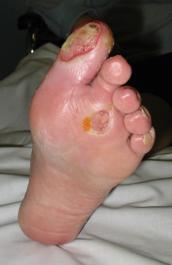Diabetes is a common chronic disease marked by high levels of blood glucose resulting from defects in insulin production, insulin action, or both.
There are nearly 1.2 million people in Malaysia who have diabetes. Basically there are two types of diabetes:
- Type 1 Diabetes Mellitus
- Type 2 Diabetes Mellitus
Over 90% of the diabetic patients in Malaysia are type 2 diabetes. Both type 1 and type 2 diabetes mellitus can cause a form of chronic kidney disease called diabetic nephropathy. About 30-40% of the diabetic patients will eventually develop this condition.
Diabetic nephropathy can be seen in patients with chronic diabetes (10 years or more after onset), so patients are usually of older age (between 50 and 70 years old). Diabetic nephropathy is the leading cause of kidney disease and end stage kidney failure in the Malaysia.
The good news is that for those patients who have no protein appearance in urine, they only have 1 percent chance of developing kidney disease after 20 to 25 years.
Presentation
Typically the patients would have paucity of symptoms during the early stages of the disease. Early symptoms include complaint of passing protein in urine (frothy urine) and the need for passing urine frequently at the night time. If left untreated, the patients would notice lower limbs swelling, lack of appetite, poor energy level and breathing difficulty.
At this time the patients would have suffered other complications of diabetes such as poor vision, poor healing skin wounds, numbness and coldness of the lower limbs due to poor blood flow, stroke, heart attack or angina (mild form of heart attack).
Risk factors for diabetic nephropathy
The following are the risk factors for diabetic nephropathy:
- Family history of diabetes
- Duration of diabetes
- High blood pressure
- Intraglomerular hyperfiltratrion is a jargon for laymen
- Poor sugar control
- Obesity
- Smoking
Treatment for diabetic nephropathy
Several areas are important in the medical care of patients with diabetic nephropathy. These include:
- Good glyceamic control and keeping Hba1c < 7%
- Keeping blood pressure below < 140/90mmHg
- Reducing dietary salt and sugar intake to less than 5 gram per day
- Low salt diet is actually less than 2-2.5 gm/day (usually estimated by one teaspoon of salt that is equivalent to 2.3 gm of sodium)
- We feel that by quoting sugar intake less than 5 gm; it is better to state low carbohydrate diet and avoidance of fine sugar altogether
- Treating hyperlipidemia
- Exercise for 20 minutes a day
- Restricting protein intake as recommended by doctor or dietician
- For those who have protein in the urine, taking drugs such as ACEI or ARB
Prevention of diabetic nephropathy
- Learn how to use home blood glucose testing kit and use it regularly — this will enable one to measure the blood glucose levels and match it with the medication given
- Learn how to inject insulin if one is prescribed one
- Quit smoking
- Follow the diet as advised by the doctor and eat small meals at regular times.
- Exercise regularly
- Visit the doctor regularly to get the blood glucose levels checked and urine tested
- The eyes and feet should be examined regularly for signs of diabetic complications
- If you’re overweight, lose weight — losing as little as a few kilograms can improve the blood sugar remarkably

Diabetic leg complication – leg ulcer
Exams and Tests
The hallmark of diabetic nephropathy is persistent protein in the urine. A urine dipstick is a simple test that can pick up early stages of kidney disease. A positive test often means one have at least some damage to the kidney from diabetes. Damage at this stage may be reversible.
Other laboratory tests that may be done include:
- Renal profile
- Bone profile
- 24-hour urine protein quantification and creatinine clearance
- Blood sugar and cholesterol
- HbA1C level
- Phosphorus, calcium and parathyroid hormone
- Full blood count
- Ultrasound kidneys
- Plain X-Ray of Kidney-ureter-bladder
Support group available :
- Malaysia Society of Nephrology together with Ministry of Health and National Kidney
- Foundation of Malaysia have created an awareness program since 16.6.2005. More details at : http://www.msn.org.my and www.nkf.org.my.
| Last Reviewed | : | 14 July 2011 |
| Writer | : | Prof. Madya Dr. Christopher Lim Thiam Seong |







